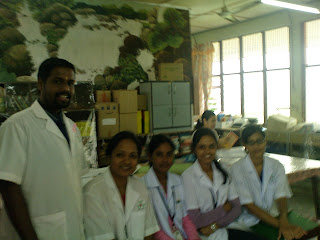MISSION :
2nd Fogging due to positive Dengue case (done on 7th day after the 1st fogging)
OBJECTIVES:
To control Dengue outbreak at that particular area
To kill possible remaining adult mosquitoes carrying Dengue virus (1st fogging only killed adult infected mosquitoes but not the infected larvae)
Enable student to learn the process of fogging like us
LOCATION:
Bandar Baru Housing area, Sungai Petani, Kedah (HOT SPOT OF DENGUE OUTBREAK)
DATE&TIME:
29 JULY 2008, 1730-1930 HOUR
TEAM:
Pekerja Rendah Am PRA U1, 13 AIMST Medical Students, Municipal Workers
LAW USED:
Destruction of Disease-Bearing Insect Act 1975 (DDBIA) and Prevention & Control of Infectious Disease
TARGET:
All of the unfortunate flying mosquitoes (since we can't specifically kill Aedes)
TOOLS USED:

Termal Fogging Machine (Looks like machine-gun to us)

Goggle

Sound proof device

Really cool Mask

Old Style Uniform (No one can see him at nitght)

New look (He is such a good poser)
DESCRIPTION:
a)Mosquitoes are like us, we don't like hot sun
b) By evening, the sun sets and human heat easily sensed by their 'infrared eyes'
c) the active ingredient will evaporate like sweats into the air making it less effective in killing mosquitoes.
Fogging will be done within 1-2 hours for 2 reasons: a) to prevent staff from tripping steps or falling into a drain due to fogging effect and pitch black night b) the resident could not start their dinner
Fogging shall never be done in 3 situations: a) when there is funeral or marriage in that particular place b)when it is raining c) when there is a kenduri (Feast/party)
Fogging is normally done from 6.30-7.30pm but also depends on the sunset mainly.
- If a person do not allow fogging to proceed in the house, a notice is given and if the person still ignore the notice, DDBIA 1975 can be used in lawsuit.
- There are 2 types of fogging methog namely Ultra Low Volume (ULV), whereby a car is used to spray the insecticide and thermal fogging machine which was shown above.
- ULV can only fog outside of the residency and a slow moving vehicle with 5-8km/hr speed is required.
- Thermal fogging machine can be used to fog outside and inside the house but require more apparatus.
- A radius of 200m must be 'fogged' simultaneously (why so?it's because the mosquitoes can't fly beyond 200m radius thus they will have to die within 200, exception applied to mosquitoes with good stamina)
- The active substance used as insecticide is Permethrin.
- It can be prepared as water based (water + Permethrine) or oil based (20mL of Permethrine/1L of diesel).

Water based perparation
- The fogging tank can fit around 5.5 L thus a total of 5L preparations can be prepared. Let's test you math! If 5L is to be prepared, how much liter(s) of Permethrin needed?
METHOD:
- Notify the residents about the fogging so that they can take appropriate measures to cover their food and keep their clothes.
- Fog areas including drain, bushes, houses and surrounding area.
- Bath straight away after conducting such activities.
THUMBNAILS:

Reaching the "HOT SPOT"
When we reached the destination, the 13 of the AIMST medical students of Batch 7 went to notify the residents and guess what happened to the individual of them?
1. THE RESIDENTS THOUGHT THAT WE WERE SALESMAN AND SALESGIRL .... (==,")

2. DINESHI AND THANA WERE GREETED BY SOMETHING BEFORE THE GATE...

A CUTE SHORTY DOG BARKING TO SAY 'DON'T FOG ME...'

3. GAN WAS FOLLOWED SILENTLY BY A GUEST BEFORE HE NOTICED IT

YEA.... A TAME-LOOKING SIBERIAN HUSK! THANK GOD HE'S BEFORE THE GATE
4. RATHNA, HELLY, AND PARI CALLED THE OWNER BUT THEY WE'RE HIDING IN THE HOUSE NOT COMING OUT

5. THANA FELT WIERD WHEN THE DOOR IS WIDELY OPEN BUT NO PEOPLE IN THE HOUSE AT THAT PARTICULAR TIME

6. KAVITHA AND PRAVENA GOT A GOOD RESIDENT WHO LISTENS TO THEM

After the notification to the residents, we waited the staffs to fog but they were sitting at corridoor as if they were waiting for someone. However we discovered our own activities while waiting for the so-called 'someone'.
We were contesting 'who is holding the thermal fogging machine correctly'. In you opinion, which of the following are the correct method of holding a 'fogging machine'?

Dineshi's 'salesgirl's' style?

Yew Chai's 'soldier-of-fortune' style?

Rathna's 'i-am-going-to-school' style?

Shankri's 'Anopheles-resting-position' style?

Pravena's 'Aedes-resting-position' style?

Gan's 'holding-a-guitar' style?

Kavitha's 'Selamba' syle?

Helly's 'stewardess' style?

Chia Leong's single-handed style?

Pari's 'holding-a-handbag' style?

Gaaitheri's 'Terkangkang' style?
BESIDES THAT, GAN FOUND OTHER USAGE OF THE FOGGING APPARATUS.

Ever wonder why the DJ's not deaf? Because they used sound-proof device in Disco

The goggle is sealed so tight that it can also be used for swimming.
After 20 minutes of waiting, we arranged the fogging machines on the floor and we stood around waiting what the staffs were waiting for.

Finally after 30 minutes of waiting we got to know what were the staff actually waiting for.

They were waiting the Municipal 'Fogger' Team
The operation then began:

He looks like a SWAT rather than a 'fogger'

They started that noisy buzzing sound of the fogging machine. Maybe it is the loud buzzing sound that frightened those mosquitoes away rather than that Permethrine.

LOCk & LOAD!!~~ (He actually waited 15s for me to snap him in that position)

ERm.. Mr. Fogger, where is the smoke?Is your machine working?

Have you ever wonder why the smoke is not as white as you seen before? That's because they used water based preparations.

This is what we call oil-based preparations (hmn.. he's not wearing Gan's DJ head-set and not even a swimming goggle)

Water-based fogging is suitable for inner house fogging.
Hope you guys and girls enjoy this session!














































